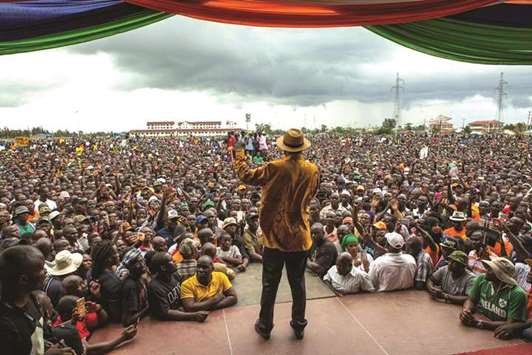At a memorial in western Kenya for opposition supporters killed in protests against the vote set for October 26, Odinga told his supporters not to attack “innocent people” including those supporting his rival President Uhuru Kenyatta.
He did not comment on an announcement by the electoral board chief executive Ezra Chiloba earlier in the day that he would take three weeks’ leave.
Kenya is holding the re-run after the Supreme Court threw out the result of an August 8 election won by the incumbent Kenyatta but disputed by the challenger Odinga.
The opposition leader has refused to participate in the re-run, arguing that reforms were needed first to prevent fraud.
The opposition has demanded Chiloba resign, and the announcement that he will not participate in running the vote suggests progress in behind-the-scenes negotiations involving Western diplomats and religious and civil society leaders.
Uncertainty over whether Odinga will participate in the election and concerns that it may not proceed peacefully have left Kenya, a traditionally stable Western ally in an often chaotic region, mired in political crisis.
The volatile build-up to the October 26 vote has revived memories for Kenyans of ethnically charged violence that killed around 1,200 people after a disputed election in 2007, when Odinga also lost and disputed the result.
Chiloba told Reuters that, in light of the opposition’s demands, he was going on leave, and that all arrangements for next week’s vote were in place.
At least 45 people died nationwide in a police crackdown on opposition supporters after the August vote, including a six-month old baby struck on the head by a police baton.
With Odinga yet to respond to Chiloba’s decision to go on leave, diplomats said they were unsure what would happen next.
“The crystal ball is very cloudy at the moment,” a senior Western diplomat in Nairobi told Reuters. “The situation is changing by the hour.”
The electoral board has said next week’s election will go ahead.
Odinga met its chairman Wafula Chebukati on Thursday and later told reporters that if there were serious consultations and serious reforms, the opposition could review its boycott.
Chebukati had said a day earlier that he could not guarantee the election would be free and fair, citing interference from politicians and threats of violence against colleagues.
A fellow board member resigned this week after fleeing to the United States, saying she feared for her life.
The opposition has held near-daily protests demanding electoral reforms and the sacking of board officials.
Police said yesterday that four people were killed as a result of their interventions to stop demonstrations.
Kenyatta has meanwhile urged Kenyans to come out in large numbers to vote, insisting that the ballot be held.
On Thursday, the president snubbed an invitation to meet Chebukati, saying that he would instead spend the time campaigning.
In a speech in Nairobi yesterday, Kenyatta said the election must not divide the nation or push it to the brink.
Disruptions of the vote by “those who thrive in chaos and relish anarchy” would not be tolerated, and security forces “have been enhanced and appropriately deployed to maintain law and order”, he said.

